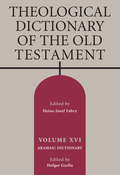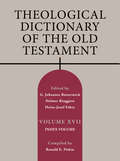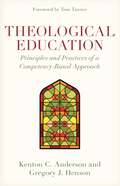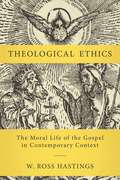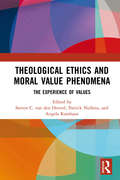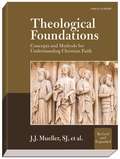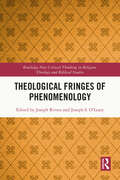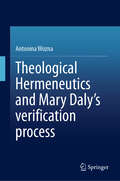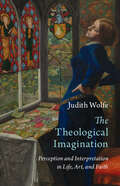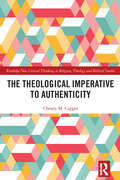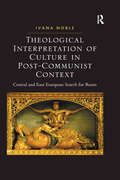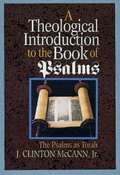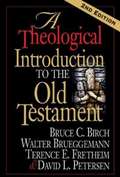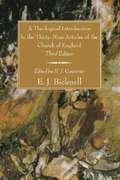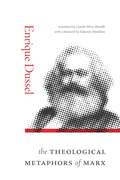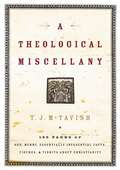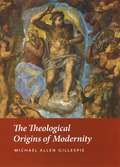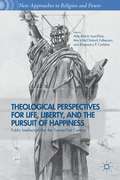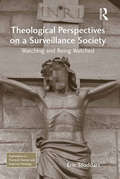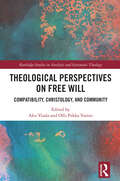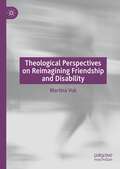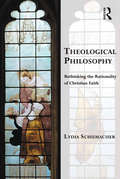- Table View
- List View
Theological Dictionary of the Old Testament, Volume XVI (Theological Dictionary Of The Old Testament Ser. #11)
by G. Johannes Botterweck; Helmer Ringgren; Heinz-Josef FabryVolume XVI concludes the monumental, critically acclaimed Theological Dictionary of the Old Testament with an Aramaic dictionary.This latest and last TDOT volume incorporates nearly the complete lexicon of Biblical Aramaic as well as a major portion of the theologically, culturally, and historically relevant terms in other ancient Aramaic writings. Each article provides information on the term&’s meaning and usage, is fully annotated, and contains a bibliography with cross-references to the entire TDOT series.Further enhancing this volume are an introductory overview of the history of Aramaic and a comparative grammatical outline of ancient Aramaic at the end of the book.
Theological Dictionary of the Old Testament, Volume XVI (Theological Dictionary Of The Old Testament Ser. #14)
by G. Johannes Botterweck; Helmer Ringgren; Heinz-Josef FabryVolume XVI concludes the monumental, critically acclaimed Theological Dictionary of the Old Testament with an Aramaic dictionary.This latest and last TDOT volume incorporates nearly the complete lexicon of Biblical Aramaic as well as a major portion of the theologically, culturally, and historically relevant terms in other ancient Aramaic writings. Each article provides information on the term&’s meaning and usage, is fully annotated, and contains a bibliography with cross-references to the entire TDOT series.Further enhancing this volume are an introductory overview of the history of Aramaic and a comparative grammatical outline of ancient Aramaic at the end of the book.
Theological Dictionary of the Old Testament, Volume XVII: Index Volume (Theological Dictionary of the Old Testament)
by Ronald E. PitkinThis useful resource, which concludes the illustrious Theological Dictionary of the Old Testament, provides TDOT users with an index to all sixteen previous volumes. The first part of this volume indexes keywords in Hebrew, Aramaic, and English, while the second part indexes all textual references—both biblical and extrabiblical.
Theological Education: Principles and Practices of a Competency-Based Approach
by Kenton C. Anderson Gregory J. HensonTheological Education demonstrates how churches and seminaries can cooperate through a competency-based learning approach to ministry preparation--that is, competency-based theological education (CBTE). CBTE focuses on the mutual mission of the church and theological education: developing followers of Christ who flourish in their vocations. This first book-length treatment of CBTE lays the groundwork for expansion and refinement as theological schools and churches move together in partnership, exploring: - Principles that ground successful CBTE cooperation, such as collaborative mission, contextualized discipleship, and holistic assessment; and - Practices that a CBTE approach requires, such as affordable programs, flexible technology, and continuous improvement Using the CBTE model means seminaries can provide practical ministry training together with churches who invest in the theological education of those who minister among them.
Theological Ethics: The Moral Life of the Gospel in Contemporary Context
by W. Ross HastingsBe Prepared to Think Theologically through Today's Most Pressing Ethical and Moral Issues In Theological Ethics theologian, pastor, and ethicist W. Ross Hastings gives pastors, ministry leaders, and students a guide designed to equip them to think deeply and theologically about the moral formation of persons in our communities, about ethical inquiry and action, and about the tone and content of our engagement in the public square. The book presents a biblical perspective and a gospel-centered framework for thinking about complex contemporary issues in ways are life-giving and that will lead readers into greater flourishing as human persons in community.This book is distinctive in presenting:A framework for theological ethics that is robustly theological and Trinitarian. Ethics isolated from the gospel and theology becomes bad news, but when it is informed by and empowered by participation in the triune God of grace, it is part of the good news of the gospel.An approach to theology and theological ethics that makes the Word of God the ultimate authority and it is therefore grounded in the biblical narrative and texts.An understanding that theological ethics are inherently missional. The church as the image of the triune God makes it the home of ethics, but in light of its missional identity, it will reverberate outwards to engage the world in ways that are humble and not power-mongering, that are gospel-based and shalom-evoking. Theological Ethics is for those who lead churches or ministries (or someday will) and who urgently need deep theological grounding as they daily encounter ethical and moral issues where they need to provide a gracious, truthful, and gospel-directed response.X
Theological Ethics and Moral Value Phenomena: The Experience of Values
by Steven C. Van Den Heuvel Patrick Nullens Angela RoothaanThe experience of moral values is often side-lined in discussions about moral reasoning, and yet our values define a large part of our moral motives, standards and expectations. Theological Ethics and Moral Value Phenomena explores whether the experience of a meeting point of the immanent and the transcendent, i.e. the moral self and God, can be the source of our values. The book starts by arguing for a greater theological engagement with value ethics, personalism and the phenomenological method by drawing on thinkers such as Max Scheler and William James. It then provides an understanding of the social and religious dimension of the valuing person, demonstrating the importance of the emotional, as well as the cognitive, dimension of value experience. Finally, this value perspective is utilised to engage with current moral issues such as professional ethics, environmental ethics, economical ethics and family ethics. Integrating the concepts of religious experience, moral motivation, and subjective and objective value within a broad framework of Christian theology and philosophy, this is vital reading for any scholar of Theology and Philosophy with an interest in ethics and moral reasoning.
Theological Foundations: Concepts and Methods for Understanding Christian Faith (Revised and Expanded Edition)
by J. J. MuellerThis book is about how to successfully study theology and provides a solid foundation for a theological discussion.
Theological Fringes of Phenomenology (Routledge New Critical Thinking in Religion, Theology and Biblical Studies)
by Joseph Rivera Joseph S. O’LearyThis book focuses on the relationships between phenomenology and theology, which have been varied and complex but seem currently in an inconclusive and loosely defined state. Methodological rigor is not much in evidence, and the two disciplines continue to defy any authoritative synthesis. While both disciplines grapple with questions concerning the fundamental structures of human experience, their relationship is troubled by the elusive roles of Revelation and faith, which threaten the scientific autonomy of philosophy on one side and disable theologians for consistent philosophical discourse on the other. This volume revisits that conundrum from various perspectives, as it at once repristinates some of the most vibrant points of encounter and opens possibilities for new beginnings. It begins with the theological musings into which leading phenomenologists have been drawn from the start, with special reference to Husserl, Heidegger, and Michel Henry, as well as backward glances to Fichte, Schelling, and Blondel. A second section takes up specific theological themes and examines how phenomenological approaches can refine thinking on them. These include the Incarnation, the Resurrection, the Eucharist, Grace, and Prayer. A dialogue between phenomenology and classical theologians is staged in the third section: Augustine, Pseudo-Dionysius, Eckhart, and Karl Rahner. The closing section ranges more widely, discussing atheism, non-realist theology, and Hinduism from phenomenological angles, and showing how these topics too come within the ambit of theology.
Theological Hermeneutics and Mary Daly's verification process
by Antonina WoznaTheological Hermeneutics and Daly's verification process offers an original overview of Mary Daly’s inputs to the theological hermeneutics from the feminist perspective. In the context of multiple theological methodologies and a growing interest for gender and feminist studies, it provides keys to design relevant approach to theology as a method. This book shows how gender bias affects theological discourses and how gender discourse oriented to the good of women, can be a paradigm of theology and a criterion of the most effective transmission of faith and social transformation. This book is an important read for scholars working in the intersection of theology, gender and feminism, and a great addition to Antonina Wozna's book on Mary Daly’s (1928-2010) Theological Method of Ontolinguistic Hermeneutics.
The Theological Imagination: Perception and Interpretation in Life, Art, and Faith (Current Issues in Theology)
by Judith WolfeHow can we live truthfully in a world riddled with ambiguity, contradiction, and clashing viewpoints? We make sense of the world imaginatively, resolving ambiguous and incomplete impressions into distinct forms and wholes. But the images, objects, words, and even lives of which we make sense in this way always have more or other possible meanings. Judith Wolfe argues that faith gives us courage both to shape our world creatively, and reverently to let things be more than we can imagine. Drawing on complementary materials from literature, psychology, art, and philosophy, her remarkable book demonstrates that Christian theology offers a potent way of imagining the world even as it brings us to the limits of our capacity to imagine. In revealing the significance of unseen depths – of what does not yet make sense to us, and the incomplete – Wolfe characterizes faith as trust in God that surpasses all imagination.
The Theological Imperative to Authenticity (Routledge New Critical Thinking in Religion, Theology and Biblical Studies)
by Christy CapperFrom a theological viewpoint, this book explores the junction between the philosophical existential idea of the authentic self and its cultural appropriation. The text builds on the theology of John Macquarrie and the narrative formation of identity to construct a theological definition of authentic selfhood. It then contrasts this definition with the common idea that authenticity, in the moral sense, can be used to justify any action. The author argues that this is not genuine authenticity. Instead, they consider that authenticity rests upon loyalty to something greater than oneself, and for Christians this is the character of the God in whose image they are created and are being formed. This book is illuminating reading for students and scholars of theological anthropology, pastroral theology, ethics and moral philosophy.
Theological Interpretation of Culture in Post-Communist Context: Central and East European Search for Roots
by Ivana NobleTwenty years after the fall of Communism in Central and East Europe is an ocassion to reevaluate the cultural and theological contribution from that region to the secularization - post-secularization debate. Czech theologian Ivana Noble develops a Trinitarian theology through a close dialogue with literature, music and film, which formed not only alternatives to totalitarian ideologies, but also followed the loss and reappeareance of belief in God. Noble explains that, by listening to the artists, the churches and theologians can deal with questions about the nature of the world, memory and ultimate fulfilment in a more nuanced way. Then, as partakers in the search undertaken by their secular and post-secular contemporaries, theologians can penetrate a new depth of meaning, sending out shoots from the stump of Christian symbolism. Drawing on the rich cultures of Central and East Europe and both Western and Eastern theological traditions, this book presents a theological reading of contemporary culture which is important not just for post-Communist countries but for all who are engaged in the debate on the boundaries between theology, politics and arts.
A Theological Introduction to the Book of Psalms: The Psalms as Torah
by J. Clinton Mccann Jr.Taking his point of departure from the newest frontier of research, McCann reads the psalms in the context of their final shape and canonical form. He interprets the psalms as scripture as well as in their character as songs, prayers, and poetry from Israel's history. McCann's intent is to contribute to the church's recovery of the psalms as torah--as instruction, as a guide to prayer, praise of God, and pious living. The explicit connections which McCann draws from the psalms to the New Testament and to Christian faith and life are extensive, making his work suitable for serious study of the psalms in academic and in church settings. An appendix examines the tradition of singing the psalms and offers suggestions for the use of the psalms in worship.
Theological Introduction to the Old Testament
by Bruce C. Birch Walter Brueggemann Terence E. Fretheim David L. PetersenA Theological Introduction to the Old Testament: 2nd Edition
by Walter Brueggemann Bruce C. Birch Terence E. Fretheim David L. PetersenThis book has become a standard text in seminary and university classrooms. The purpose of this second edition is to help readers come to a critically informed understanding of the Old Testament as the church's scripture. This book introduces the Old Testament both as a witness of ancient Israel and as a witness to the church and synagogue through the generations of those who have passed these texts on as scripture. The authors of this volume share a commitment to the interpretation of the Old Testament as a central resource for the life of the church today. At the same time, they introduce the Old Testament witness in a manner that honors the importance of biblical scholarship in helping students engage the variety of theological voices within the Old Testament. This second edition gives special attention to deepening and broadening theological interpretations by including, for example, issues related to gender, race, and class. It also includes more detailed maps and charts for student use.
A Theological Introduction To The Thirty-nine Articles Of The Church Of England (Third Edition)
by E. J. Bicknell H. J. CarpenterA NEW book upon the Thirty-nine Articles by an author entirely un¬known requires an apology. <P><P>I can only plead that it is an attempt to meet a need openly expressed on all sides by those engaged in the teaching of theology, for a book on new and broad lines. <P>My excuse for undertaking the task is that no one is likely to do so who has not been engaged in lecturing on the Articles, and the number of such is small. <P><P>The book is intended in the first instance for students, but it is hoped that large portions of it may be found useful by ordinary men and women who are prepared to make an effort to understand Christian doctrine. <P>It makes no claim to originality of thought, but contains a large amount of material collected from various sources into a single volume for the first time.
The Theological Metaphors of Marx
by Enrique DusselIn The Theological Metaphors of Marx, Enrique Dussel provides a groundbreaking combination of Marxology, theology, and ethical theory. Dussel shows that Marx unveils the theology of capitalism in his critique of commodity fetishization. Capitalism constitutes an idolatry of the commodity that undergirds the capitalist expropriation of labor. Dussel examines Marx’s early writings on religion and fetishism and proceeds through what Dussel refers to as the four major drafts of Capital, ultimately situating Marx’s philosophical, economic, ethical, and historical insights in relation to the theological problems of his time. Dussel notes a shift in Marx’s underlying theological schema from a political critique of the state to an economic critique of the commodity fetish as the Devil, or anti-God, of modernity. Marx’s thought, impact, and influence cannot be fully understood without Dussel’s historic reinterpretation of the theological origins and implications of Marx’s critiques of political economy and politics.
A Theological Miscellany: 160 Pages of Odd, Merry, Essentially Inessential Facts, Figures, and Tidbits about Christianity
by Mctavish MctavishEver felt mortally embarrassed when all your friends are discussing the merits of "the 5 points of Calvinism" and you don't have the foggiest idea what they're talking about? Ever kicked yourself for not knowing which popes reigned the shortest amount of time? (First on the list is Pope Urban VII, who ruled for a whopping 13 days.) Well, where else could you find the answer to all your problems, but in A Theological Miscellany-a maddeningly addictive cornucopia of trivia and smorgasbord of stuff that will keep you up late at night, reading just one more page. The best little book of trivia and oddities you'll ever find. . . . And if not the best, then certainly in the top ten.
The Theological Origins of Modernity
by Michael Allen GillespieExposing the religious roots of our ostensibly godless age, Michael Allen Gillespie reveals in this landmark study that modernity is much less secular than conventional wisdom suggests. Taking as his starting point the collapse of the medieval world, Gillespie argues that from the very beginning moderns sought not to eliminate religion but to support a new view of religion and its place in human life. He goes on to explore the ideas of such figures as William of Ockham, Petrarch, Erasmus, Luther, Descartes, and Hobbes, showing that modernity is best understood as a series of attempts to formulate a new and coherent metaphysics or theology. "Bringing the history of political thought up to date and situating it against the backdrop of contemporary events, Gillespie's analyses provide us a way to begin to have conversations with the Islamic world about what is perhaps the central question within each of the three monotheistic religions: if God is omnipotent, then what is the place of human freedom?"--Joshua Mitchell, Georgetown University
Theological Perspectives For Life, Liberty, And The Pursuit Of Happiness
by Ada María Isasi-díaz Mary Mcclintock Fulkerson Rosemary P. CarbineRather than wield religion as a weapon or a ruse in irrational appeals, the book attempts to reimagine a shared American mythos and ethos, by reminding us of our shared stake in creating an America committed to the life of all peoples and species and to the full developments of our capabilities as an exercise of liberty.
Theological Perspectives on a Surveillance Society: Watching and Being Watched (Explorations in Practical, Pastoral and Empirical Theology)
by Eric StoddartThis book looks at contemporary surveillance practices and ideologies from a Christian theological perspective. Surveillance studies is an emerging, inter-disciplinary field that brings together scholars from sociology, criminology, political studies, computing and information studies, cultural studies and other disciplines. Although surveillance has been a feature of all societies since humans first co-operated to watch over one another whilst hunting and gathering it is the convergence of information technologies within both commerce and the state that has ushered in a 'surveillance society'. There has been little, if any, theological consideration of this important dimension of social organisation; this book fills the gap and offers a contribution to surveillance studies from a theological perspective, broadening the horizon against which surveillance might be interpreted and evaluated. This book is also an exercise in consciousness-raising with respect to the Christian community in order that they may critically engage with a surveillance society by drawing on biblical and theological resources. Being the first major theological treatment in the field it sets the agenda for more detailed considerations.
Theological Perspectives on Free Will: Compatibility, Christology, and Community (Routledge Studies in Analytic and Systematic Theology)
by Aku Visala Olli-Pekka VainioFree will is a perennial theological and philosophical topic. As a central dogmatic locus, it is implicated in discussions around core Christian doctrines such as grace, salvation, sin, providence, evil and predestination. This book offers a state-of-the-art look at recent debates about free will in analytic and philosophical theology. The chapters revolve around three central themes: the debate between theological compatibilists and libertarians, the communal nature of Christian freedom, and the role of free will in Christology. With contributions by leading scholars, the volume provides a valuable overview of current arguments as well as novel openings and ideas for further discussion.
Theological Perspectives on Reimagining Friendship and Disability
by Martina VukThis book rethinks the anthropology of friendship from the perspective of theology and disability, and suggests the respect for human dignity and the person´s vulnerability as the criterion in reconsidering such an anthropology. The reality of disability is not only the reality of being in the world, but also concerns the concept of the meaning of otherness and being created as an image of God. The constructive critique that the emergence of disability as a human condition posits to theo-anthropological and ethical concepts is the quest of the renewal of theo-anthropological and ethical knowledge on the meaning of disability, otherness and friendship. The theological and anthropological entities, such as disability and friendship, are interconnected in a sense that the meaning of the one needs to be explained in the light of the other, and vice versa. The renewal of certain anthropological categories in such regard is a search for a deeper understanding of humanity, not apart from, but in light of, the presence of disability.The book examines the anthropological and theological systems regarding the theme of friendship and disability.
Theological Philosophy: Rethinking the Rationality of Christian Faith (Transcending Boundaries in Philosophy and Theology)
by Lydia SchumacherFor much of the modern period, theologians and philosophers of religion have struggled with the problem of proving that it is rational to believe in God. Drawing on the thought of Thomas Aquinas, Theological Philosophy seeks to overturn the longstanding problem of proving faith's rationality and to establish instead that rationality requires to be explained by appeals to faith. Building on a constructive argument developed in a companion book, Rationality as Virtue, Lydia Schumacher advances the conclusion that belief in the God of Christian faith provides an exceptionally robust rationale for rationality and is as such intrinsically rational. At the same time, Schumacher overcomes a common tendency to separate spiritual from ordinary life, and construes the latter as the locus of proof for the rationality of Christian faith.
Theological-Political Treatise
by Jonathan Israel Michael Silverthorne Benedict De SpinozaSpinoza's Theological-Political Treatise (1670) is one of the most important philosophical works of the early modern period. In it Spinoza discusses at length the historical circumstances of the composition and transmission of the Bible, demonstrating the fallibility of both its authors and its interpreters. He argues that free enquiry is not only consistent with the security and prosperity of a state but actually essential to them, and that such freedom flourishes best in a democratic and republican state in which individuals are left free while religious organizations are subordinated to the secular power. His Treatise has profoundly influenced the subsequent history of political thought, Enlightenment 'clandestine' or radical philosophy, Bible hermeneutics, and textual criticism more generally. It is presented here in a new translation of great clarity and accuracy by Michael Silverthorne and Jonathan Israel, with a substantial historical and philosophical introduction by Jonathan Israel.
